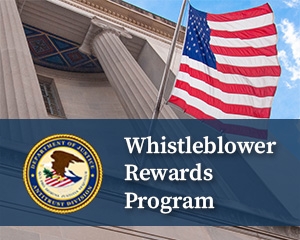Criminal Enforcement
The Antitrust Division’s criminal enforcement program holds executives and corporations accountable for antitrust crimes.
The Antitrust Division’s criminal enforcement program prosecutes individuals and corporate entities for collusion, monopolization, and other crimes that undermine the free market. It promotes competition and innovation while protecting consumers, workers, and taxpayers.
Criminal Enforcement Sections and Offices
What Is Criminal Antitrust?
Price Fixing, Bid Rigging, and Market Allocation Schemes: What They Are and What to Look For (February 24, 2021)
An Antitrust Primer for Federal Law Enforcement Personnel (October 2023)
Leniency Policy
Corporations and individuals who report their cartel activity and cooperate in the Division’s investigation of the cartel reported can avoid criminal conviction, fines, and prison sentences if they meet the requirements of the policy.
Find FAQs, policy documents, model leniency letters, and application information on the Leniency Policy page.
Learn More About the Leniency Policy
Whistleblower Rewards Program

The Antitrust Division encourages whistleblowers to report antitrust crimes and related criminal offenses. Whistleblower reports are an important part of the Antitrust Division’s efforts to investigate and prosecute companies and people who violate the criminal antitrust laws. In appropriate cases, the Antitrust Division pays rewards to whistleblowers.
Procurement Collusion

The Procurement Collusion Strike Force (PCSF) leads a coordinated national response to combat antitrust crimes and related schemes in government procurement, grant, and program funding at all levels of government—Federal, state, and local.
Fugitives
The Department of Justice Antitrust Division actively works with foreign authorities to ensure that foreign-located fugitive defendants are apprehended and extradited to the United States to face their charges. The Antitrust Division seeks information from the public regarding the location of fugitives. If you are a fugitive, the Antitrust Division urges you or your attorney to contact us to discuss the resolution of your charges.
Contact the Criminal Enforcement Program
950 Pennsylvania Avenue NW
Room 3220
Washington, DC 20530
ATTN: Criminal Enforcement Program
202-514-2401
Criminal Antitrust – Regional Enforcement Responsibilities by Section/Office
Statistics and Trends
Ten Year Workload Statistics Report (PDF | Word | XLS)
Criminal Enforcement Trends Charts (Through Fiscal Year 2023)
Sherman Act Violations Yielding a Corporate Fine of $10 Million or More (September 13, 2023)
Other Resources
Evaluation of Corporate Compliance Programs in Criminal Antitrust Investigations (November 2024)
Antitrust Red Flags for Employment Practices
DOJ/FTC Antitrust Guidance for Human Resource Professionals (October 2016)
Selection of Monitors in Criminal Cases (January 23, 2025)
Anti-retaliation Protection for Whistleblowers (U.S. Department of Labor)
Fact Sheet on the Criminal Antitrust Anti-Retaliation Act (OSHA) (English PDF | Spanish PDF)

 U.S. Department
of Justice
U.S. Department
of Justice